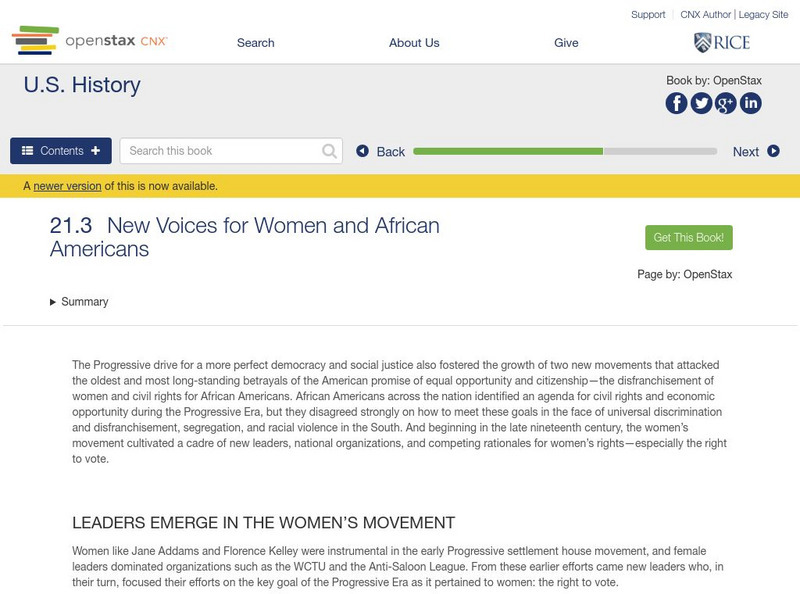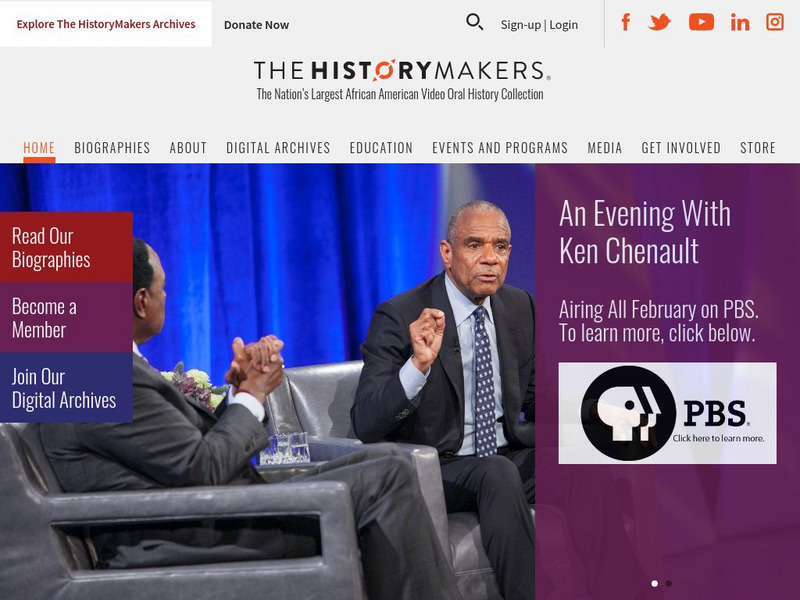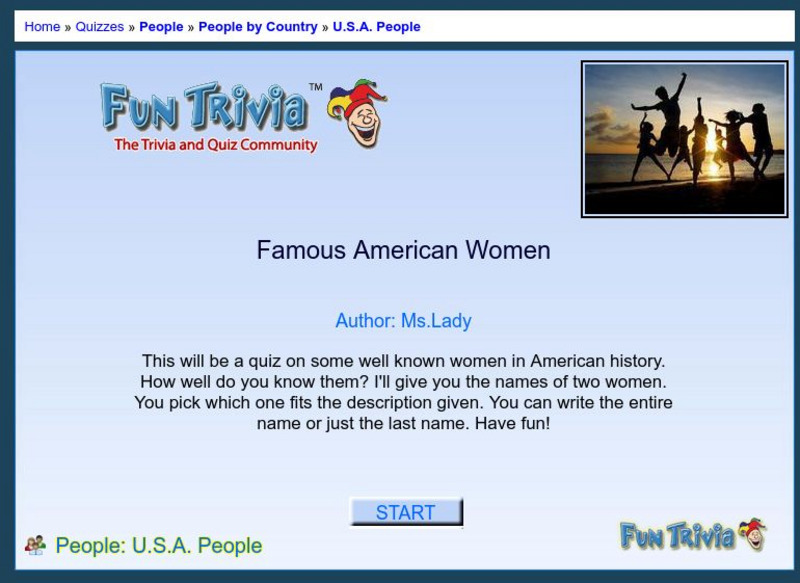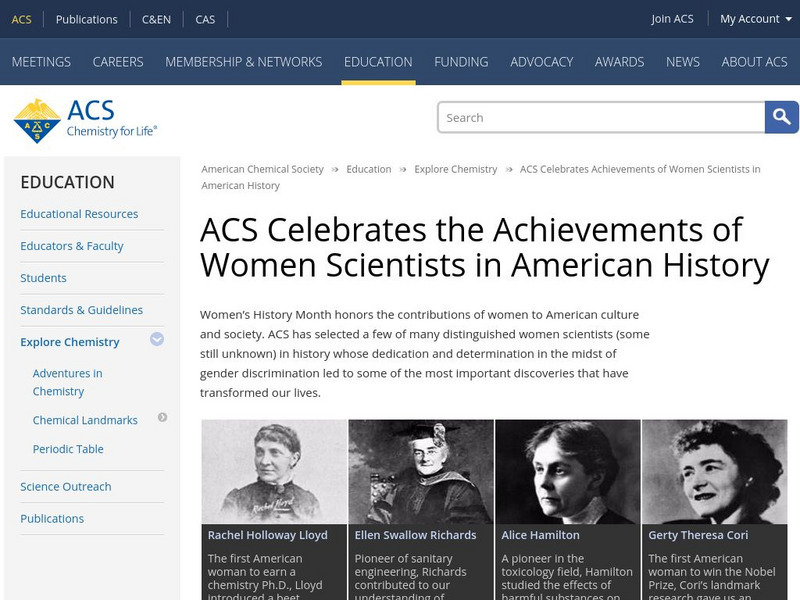OpenStax
Open Stax: Progressive Movement: New Voices for Women and African Americans
Examines how the women's rights movement began and how it evolved over time, followed by a look at the development of the African American civil rights movement and the different leaders that emerged during the Progressive Era.
Khan Academy
Khan Academy: American Women and World War Ii
Read about the opportunities that women had during World War II to work in jobs that had previously been unimaginable. To assist working mothers, the first childcare programs were begun, and efforts were made to make jobs in the defense...
Khan Academy
Khan Academy: African Americans, Women, and the Gi Bill
Although the GI Bill was intended to provide benefits to all WWII veterans, African Americans and women who had served had difficulties taking advantage of them due to discriminatory practices at the state and local levels.
Library of Congress
Loc: Teachers: Women P Ioneers in American Memory
This is an online resource from the Library of Congress discussing Women Pioneers. Includes some audio and internal links for more information.
Library of Congress
Loc: Primary Source Set: Women's Suffrage
A collection of primary sources dealing with women's suffrage.
Other
Maryland Public Schools: Maggie L. Walker History Lesson Plan [Pdf]
With this lesson plan, students will learn about the life of African American teacher and entrepreneur Maggie L. Walker, the woman to own a bank in the United States. This document includes teacher resources, student resources and...
University of Richmond
University of Richmond: History Engine: Maggie L. Walker
This brief biography of Maggie L. Walker outlines her rise to success as the first African American bank owner in the United States.
Other
The History Makers
Thehistorymakers.com features the stories of African Americans who have succeeded and made achievements in the areas of art, business, education, law, politics, science, religion, and sports. There is a great timeline of African American...
Other
Ipu: Women's Suffrage
American women could run for election in 1788, but could not vote until 1920. This and other ironies are revealed in this timeline that shows the progression of women's political rights in countries from around the world.
George Mason University
American Women's Dime Novel Project
A product of a post-graduate dissertation, this project examines the genre of women's dime novels from 1870-1934. Includes a searchable catalogue of popular dime novels and authors, with links to e-books where they can be purchased....
Fun Trivia
Fun Trivia: Famous American Women
With this game, test your knowledge about famous women in American history.
Other
Constructing the Past: Shaping the American Women
This article from a history periodical looks at advertising aimed at women in the 1950s. After refuting conclusions made in a study in the 1970s that claimed that women in the 1950s were little more than domestic workers in their home,...
National Women’s History Museum
National Women's History Museum: Sybil Ludington
Sybil Ludington was just 16 years old when she made a night-time ride rallying Patriot soldiers During the American Revolution.
National Women’s History Museum
National Women's History Museum: Jovita Idar
Read about the life and times of Mexican-American journalist, activist, and suffragist, Jovita Idar.
National Women’s History Museum
National Women's History Museum: Deborah Sampson
Deborah Sampson disguised herself as a man and joined the Patriot forces during the American Revolution. She was the only woman to earn a military pension for participation in the Revolutionary army.
National Women’s History Museum
National Women's History Museum: Mercy Otis Warren
Learn about the life of Mercy Otis Warren, a published poet, political playwright, and satirist, as well as the leading female intellectual of the American Revolution.
National Women’s History Museum
National Women's History Museum: Freedom Summer
During the summer of 1964, hundreds of college students flooded Mississippi to register African Americans to vote.
National Women’s History Museum
National Women's History Museum: Mary Musgrove
Mary Musgrove become a negotiator between English and Native American communities and played an important role in the development of Colonial Georgia.
National Women’s History Museum
National Women's History Museum: Anne Spencer
Learn about the life and works of Harlem Renaissance poet Anne Spencer who lived her entire life in Virginia and fought for equal rights for African Americans.
National Women’s History Museum
National Women's History Museum: Phillis Wheatley
Despite spending much of her life enslaved, Phillis Wheatley was the first African American woman to publish a book of poems.
National Women’s History Museum
National Women's History Museum: The Sit in Movement
Being served at a lunch counter was normal for whites, but African Americans were not allowed to sit at lunch counters throughout the South. Learn details of the Greensboro Sit-In.
American Chemical Society
American Chemical Society: Achievements of Women Scientists in American History
A collection of profiles of American women who have made significant contributions to science.
National Women’s History Museum
National Women's History Museum: Angelina Grimke Weld
Although raised on a slave-owning plantation, Angelina Grimke Weld became an ardent abolitionist.
National Women’s History Museum
National Women's History Museum: Helen Keller
Undeterred by deafness and blindness, Helen Keller rose to become a major 20th century humanitarian, educator and writer.







![Maryland Public Schools: Maggie L. Walker History Lesson Plan [Pdf] Lesson Plan Maryland Public Schools: Maggie L. Walker History Lesson Plan [Pdf] Lesson Plan](https://d15y2dacu3jp90.cloudfront.net/images/attachment_defaults/resource/large/FPO-knovation.png)





